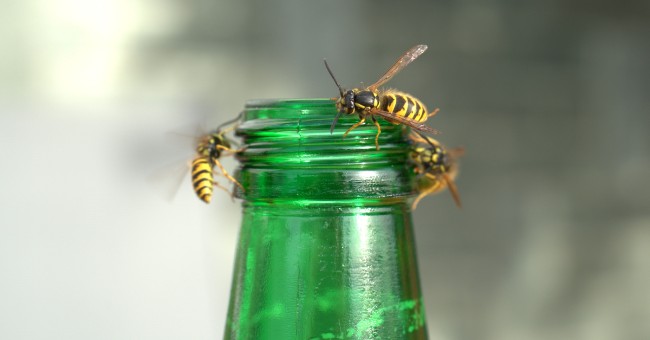
Yellowjackets
Quick Key Points
- Yellowjackets are more active/aggressive around people at the end of summer and beginning of fall when insect populations are in decline and they go looking for other food sources.
- They are attracted to meats, sweet beverages, fruits, pop cans and waste. When eating outside, make sure to cover your food and seal garbage away.
- They generally do not attack unless in self-defense and can sting multiple times, so it's important to not swat at them.
What are Yellowjackets?
Yellowjackets are beneficial insects in St. Albert’s ecosystem, feeding on other vegetation-damaging insects and houseflies, and providing some pollination services. As insect populations start to drop at the end of summer and into fall, they frequent more areas looking for other food sources, especially near people. In late summer it is important to be more cautious around yellowjackets as they are more active and may be slightly aggressive.
Wasps that are agitated, or injured, release a pheromone that can be picked up by other wasps in the area. This chemical can induce aggressive behaviour in other wasps, causing them to go on the attack. They may attack in groups, particularly if the nest is nearby.
Yellowjackets and You
Worker yellowjackets are attracted to meats, sweet beverages, fruits, pop cans and waste. They generally do not attack unless in self-defense, so swatting at them may result in a sting. Unlike honeybees, yellowjackets can sting multiple times, resulting in minor pain, swelling and irritation. The best way to handle an intrusive yellowjacket is to stay calm and gently chase it away.
Safety Tips
Here are a few tips on how to avoid getting stung by these painful insects:
- Pay extra attention to where you are walking, especially if barefoot in the grass.
- Listen for buzzing and look for wasps flying in and around holes in the ground. Avoid areas where wasps seem to be swarming or entering and exiting out of an opening.
- Avoid loose-fitting clothes. If they get stuck, they will sting you repeatedly. If a wasp gets into a piece of clothing, remove it as quickly as possible.
- Run away if you disturb a nest.
- Cover your food when eating outside (especially sweets and meats).
- Avoid wearing scented personal care products.
Prevention Tips
To limit the presence of yellowjackets and prevent nests in your yard:
- Remove log or leaf piles.
- Clean up thoroughly after cooking outside.
- Cover or remove any standing water.
- Consider planting things like spearmint, thyme, lemongrass and wormwood.
- Keep trash in sealed containers.
Nest Removal
If you need to remove a nest, proceed with caution. If it is freely hanging from a branch, remove it at dusk by carefully wrapping the nest in a plastic bag and pulling it free. Avoid disturbing the nest as much as possible.
If the nest is underground, use a yellow container filled with a mixture of water, soap and sugar. The colour and scent will attract the wasps, and they will fall into the water and get trapped.
Nests are not reused year to year, and the only overwintering colony members are queens. You can consider removing the nest in the spring as there will be fewer wasps around.
If you are not comfortable doing this yourself, or if you have allergies, it is best to contact a pest management company to help.
Learn more about wasp nests/swarms Related Pages
Last edited: August 8, 2025


